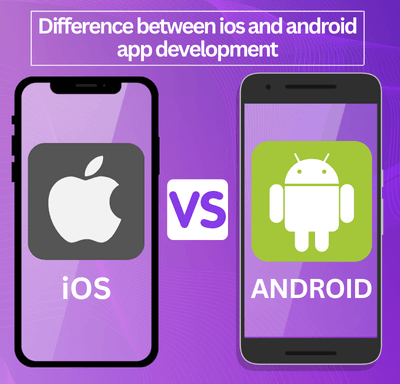
About us
Our Services
Our Expertise
Our Experience
Follow us
Why e2logy?
- We strive to provide superior customer service and ensure that every client is completely satisfied with our work.
- Our engineers are trustworthy, dedicated, and experienced and will go the extra mile to solve your IT issues.
- We are committed to delivering outstanding, cutting-edge IT solutions that add real value that goes beyond what is expected.

Difference between iOS and Android app development

The mobile software industry is currently dominated by Android apps and iOS apps, which are the battle of the titans of the tech industry.
The software production segment is seeing a surge in mobile app development.
How come?
Mobile app development offers businesses a greater opportunity to reach a wider audience because people are increasingly accessing the internet through their mobile phones and tablets.
In the mobile industry, the two main platforms are Apple iOS and Google Android. If you intend to develop an application for mobile and tablet devices, you should be aware of the difference between these platforms. When people want to develop apps for mobile platforms, they always compare Android apps with iOS apps.
Choosing between the two platforms can be a challenge. We are trying to make things simpler for you by explaining the differences between Apple and Android appstudios.
We’re going to compare iOS and Android development in more detail.
What is iOS Mobile App Development?
Apps developed for Apple’s iOS operating system are known as iOS apps. Applications on the iOS platform are compatible with iPads, iPhones, and iPod Touches.
The Apple devices are powered by a number of operating systems. MacOS is used to run applications designed for Mac computers. Apple even offers a specific iPad OS variant called iPodOS.
Apple’s mobile operating system, iOS, is tailored specifically to meet Apple’s unique device specifications and security demands.
What is Android App Development?
Mobile application development for Android is the process of creating a mobile application for the Android platform.
Many devices are available that are powered by Android (developed by Google). We offer Samsung devices, Google phones, Motorola phones, OnePlus phones, Sony phones, and many more.
More than 1,300 companies distribute Android devices, which include more than 24,000 different types.
Differences Between iOS and Android Apps
To determine which OS platform is more appropriate for building an app for your business, we compare the differences between Android and iOS app development. Let’s get started:
Target Audience
Customers know their requirements and those who know how to meet them have the best chance of success. Having a clear understanding of your target audience is one of the most critical aspects of setting business app goals. Based on the preferences of your users, choose the platform that best suits them.
There are variations in the demographic breakdowns between iOS and Android users, even though they are not completely different. 58% of iOS users in the US are 18-34 years old, while most Android users are 35+ years old, according to the Payments Journal.
In addition, most females prefer Apple software over Android, whereas most males prefer it. The average iPhone user has a higher annual income and spends more time on their phone than Android users. These data can help companies decide what operating system should be used as a starting point for their future apps.
Programming language
Secondly, the programming language you use to achieve your desired product is an important consideration in your decision. A different programming language also distinguishes Apple from Android. A Java-based Android application will most likely be developed using Java, though there are some differences between Java for Android and Java for iOS. A native Android experience was also enhanced by C++ programmers. It was recently announced that Kotlin has been added as an official Android language that is functionally equivalent to the other languages.
Check out the Google site for more information. The Swift programming language was introduced as the official iOS programming language in 2014, replacing Objective-C. A major advantage is that this framework is designed specifically for helping developers develop apps for Apple’s devices, so it isn’t difficult to learn.
Development Tools
Several third-party apps and tools are supported on Android’s open development platform. Having different features available to developers means their applications can have more functionality and they can experiment with them.
A limited set of tools are available with Apple’s application development platform. It’s still possible for developers to develop apps using external tools, but it restricts their creativity.
The cost of development
Choosing the platform, choosing the dev team, and asking for a rough estimate are all necessary steps to get an idea of how much an app costs based on business requirements. Furthermore, you should know that app development costs are determined by the length of time it takes to develop the app.
A longer app will cost more money since it requires more time. If you are interested in the cost of creating a mobile app like Uber or Snapchat, we recommend that you read about the process.
Integrated Development Environment (IDE)
Google engineers use Eclipse as a tool for developing applications backed by its search engine. Because Studio offers powerful features such as cross-platform support, simple packaging, and extensive debugging, all engineers started using it immediately.
Apps backed by Apple are developed with XCode by iOS developers. Developing amazing apps for Macs, iPhones, and iPads is incredibly easy with this software. Additionally, it can check for syntax and logic errors as well as correct them.
Monetization Strategy
iPhone users are reported to earn more money than Android users, according to studies. Apple users earn an average of $85,000 per year, compared with Android users making $61,000.
When trying to monetize your app, this is important information to keep in mind.
iOS developers can consider things like in-app purchases since iPhone users may have greater purchasing power. There are other ways Android developers can make money, such as in-app advertising, but Android developers may have to concentrate more on that.
Acceptance in application stores
The Apple App Store validation process takes longer for iOS apps compared to Android apps that need to be published on Google Play. For Android apps, all tests are automated, but for Apple apps, personal verification is required by Apple experts.
A developer can submit multiple versions of the same app during the day, and Google lets them handle some of the errors. Consequently, programmers should be very careful when submitting apps to Apple because they run the risk of being rejected if they wait too long, or having errors presented in the app if they wait too long for Android.
Key Takeaways
When choosing the platform for your first app, there are several factors to consider. In making a decision, you will consider the target audience, the development budget, the timeline, as well as the monetization strategy.
Android offers the best combination of reach, customization, and submission speed. If you are looking to generate more revenue per user, target a younger audience, or follow a less complicated development process, iOS would be the best choice for you.
Most businesses, in our experience, need assistance deciding which platform to target first. You could achieve your mobile solution with the help of a reliable software development vendor. Even a simple idea or vision of a project can be shared in a short discovery meeting.
From our experience, most businesses need help choosing their first platform. A reliable software development vendor can help you develop your mobile solution. A discovery meeting can help you share even a simple vision or idea for a project.













